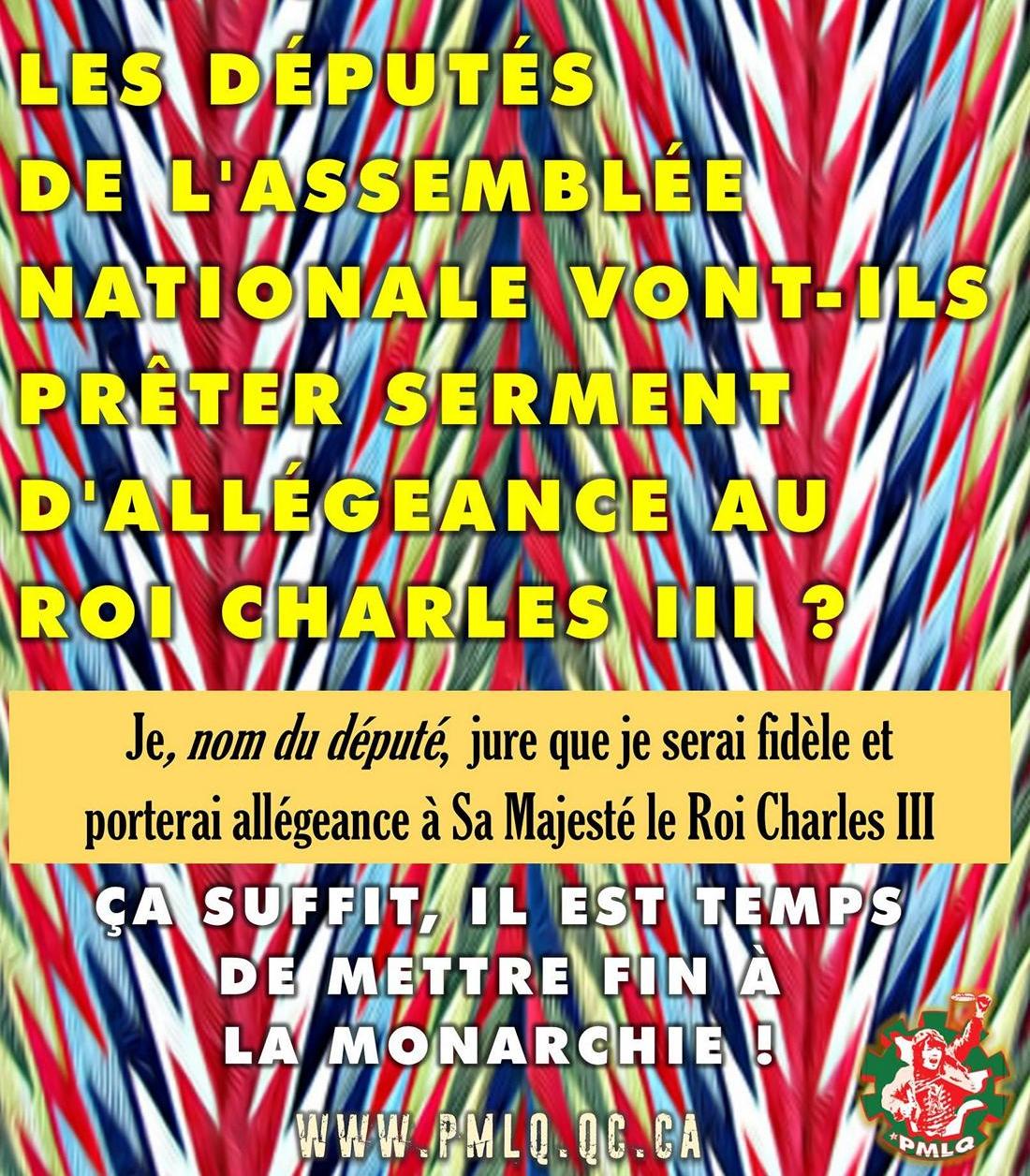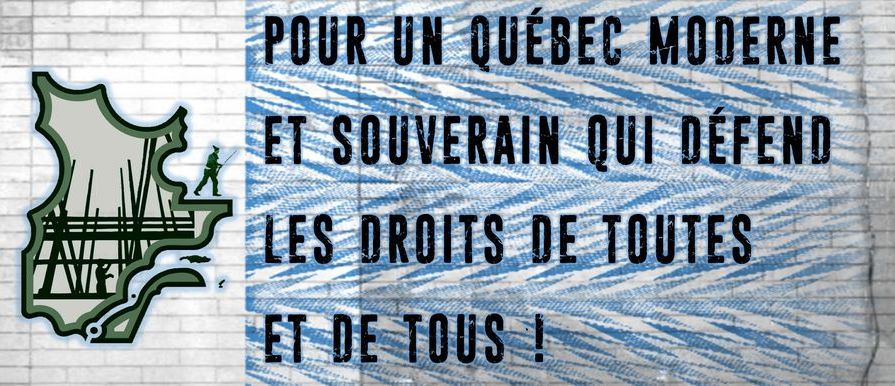October 14, 2022 - No. 29
On the Problem of Swearing Allegiance to the King of England
To Whom
Do Members of the National Assembly of Quebec Owe Allegiance?
• Québec Solidaire Should Take a Principled Stand, Not One Informed by the Canadian Constitution
For Your Information
• Press
Conference
with
Paul St-Pierre Plamondon,
Leader, Parti
Québécois
On the Problem of Swearing Allegiance to the King of England
To Whom Do Members of the National Assembly of Quebec Owe Allegiance?

At a press briefing on October 11, Parti Québécois leader and Camille-Laurin MNA Paul St-Pierre Plamondon announced that he has sent a letter to the Secretary General of the Quebec National Assembly informing him of his intention to swear an oath of office to the people of Quebec but not to the King of England. The transcript of the press conference and the letter to the Secretary General are reproduced below. The swearing-in of PQ members will take place on October 21.
The PQ leader gave several reasons for his refusal to take the oath to the king. He said, among other things, that one cannot serve two masters and that "the interest of the Quebec people is not that of the crown of a foreign country." He refers to the British colonial domination which he says is responsible for the hanging of the Patriots, the deportation of the Acadians and the Indian Act which is still in force. He believes that it would be a conflict of interest for him to swear an oath to the British monarchy.
 The
leader of the PQ also said that in law, the only law that requires an
oath to the king or queen is the Constitution Act, 1867. Indeed, the
Act respecting the National Assembly provides only for the oath to the
people of Quebec. But on its website, the National Assembly says that
the MNA must
take both oaths. Plamondon asks the National Assembly not to take
action against him out of respect for the fact that he was elected by
the people and that he will take an oath to the people of Quebec and
out of respect for freedom of conscience. He says he is prepared to
face charges from Ottawa,
the Governor General or the Lieutenant Governor if charges are laid.
The
leader of the PQ also said that in law, the only law that requires an
oath to the king or queen is the Constitution Act, 1867. Indeed, the
Act respecting the National Assembly provides only for the oath to the
people of Quebec. But on its website, the National Assembly says that
the MNA must
take both oaths. Plamondon asks the National Assembly not to take
action against him out of respect for the fact that he was elected by
the people and that he will take an oath to the people of Quebec and
out of respect for freedom of conscience. He says he is prepared to
face charges from Ottawa,
the Governor General or the Lieutenant Governor if charges are laid.
The other two PQ MNAs, Pascal Bérubé in Matane-Matapédia and Joël Arseneau in Îles-de-la-Madeleine, will also refuse to take the oath of office.
The media have asked constitutional experts about what might happen when Plamondon and his colleagues return to the National Assembly on November 15. Some have pointed out that the National Assembly does not provide for a penalty for a member who refuses to take the oath to the king. This would be a first.
According to some, there could be a modified oath. For example, instead of saying "Charles III," it could say "the Head of State." But according to the Parti Marxiste-Léniniste du Québec (PMLQ), it is obvious that this would amount to the same thing and that it would be just as unacceptable. It is a proposal that hides precisely what the current head of the Canadian state represents, namely a constitutional order that places decision-making power beyond the reach of the people. Moreover, according to the information given, the Secretary of the National Assembly would have to agree with the change and there would have to be an agreement between the parties. It is clear, then, that these proposals limit the problem to the framework of the Canadian Constitution, which has the objective of placing decision-making power beyond the reach of the people.
The procedures that require elected officials to swear an oath to a system that places the decision-making power above the people and above elected officials are designed in a manner that keeps this precise fact hidden. The decision will therefore rest with the Secretary General of the National Assembly. This is Siegfried Peters, who was elected to this position by the National Assembly on October 22, 2019. He is a lawyer by training and has worked at the National Assembly since 2002. His background leaves no doubt that he is an expert in constitutional matters and interpretation of procedures under the constitution.
The Quebec National Assembly website states this about Mr. Peters:
"He first served as a parliamentary procedure advisor and subsequently had the opportunity to work in various assignments under the Secretary General, including in the leadership of legal affairs. He was the Parliamentary Affairs Coordinator from 2011 to June 2017. Since June 2017, he served as the Director of Legal and Legislative Affairs and Parliamentary Procedure.
"Passionate about training and the transmission of knowledge, he has notably participated in the creation of university-level courses on parliamentary law and procedure and comparative parliamentarianism. He also participated in the writing of the second and third editions of the specialized work explaining the functioning of the National Assembly entitled La procédure parlementaire du Québec (Quebec's Parliamentary Procedure).
"As Secretary General, he will henceforth act as the first advisor to the President of the Assembly on parliamentary procedure, i.e. all the rules governing the conduct of parliamentary business."
The PMLQ calls on Quebeckers to call on all the elected members of the National Assembly to refuse to swear an oath to King Charles III, to the "Head of State," to the Canadian Constitution or to anything other than the people of Quebec and the voters who have mandated them. It is a matter of national dignity and of acting in a manner befitting a modern society.
(Quotations translated from the original French by TML. Graphics: PMLQ, TML.)
Québec Solidaire Should Take a Principled Stand, Not One Informed by the Canadian Constitution
On October 12, the Journal de Québec published an article under the headline "If possible, Québec solidaire will not swear allegiance to the new King of England."
 The
article makes it clear that Québec Solidaire (QS) is
hiding behind "the decisions of the National Assembly" that are based
on the Canadian Constitution which, in turn, states that King
Charles III is the "King of Canada" and its head of state and that,
therefore, elected members of Canada's legislatures, including the
Quebec National Assembly, must swear allegiance to him.
The
article makes it clear that Québec Solidaire (QS) is
hiding behind "the decisions of the National Assembly" that are based
on the Canadian Constitution which, in turn, states that King
Charles III is the "King of Canada" and its head of state and that,
therefore, elected members of Canada's legislatures, including the
Quebec National Assembly, must swear allegiance to him.
"Québec solidaire MNAs will not swear allegiance to the British Crown if the official request of the Parti Québécois is accepted by the National Assembly. Having tried it before, however, the Québec solidaire spokesperson doubts the PQ approach [will succeed]," writes the Journal de Québec.
The article quotes QS co-spokesperson Gabriel Nadeau-Dubois:
"If it is possible, of course we want to avoid it. It's important for me to point out that Mr. Plamondon's approach, although I completely respect it, has already been attempted by Québec solidaire. There are several sovereigntist MNAs since the 1970s who tried to do what Mr. Plamondon did. And unfortunately, the institution that is the National Assembly, no matter who governed it, remained very firm on this issue. We learned this ourselves the hard way."
Nadeau-Dubois then describes what QS did in the past regarding this mandatory oath to the British monarch:
"In 2018, we had tried not to take the oath to the Queen and the National Assembly had been very clear with us, maintaining that it was impossible to sit. So, we had introduced a bill to make this oath to the Crown optional. Unfortunately, Dominique Anglade's Liberals blocked it."
The facts are that in 2018, the ten Québec solidaire MNAs took the oath to the people of Quebec in public in the Legislative Council Chamber of the National Assembly (the room where parliamentary committees are held, for example), commonly called the Red Room, and they took the oath to the Queen in private in a room adjacent to the Red Room. This is even worse. Hiding, avoiding the gaze of the nation to discreetly swear the oath to the Queen of England in private, does not bode well for the future.
The bill referred to by Nadeau-Dubois was introduced on February 28, 2019 by QS MNA Sol Zanetti, MNA for Jean-Lesage, who was re-elected in that same riding on October 3.
Entitled An Act to recognize the Members' oath to the people of Québec as the sole oath required for Members to take office, Bill 192 recognized this oath as the only compulsory oath when MNAs are sworn in. It provided that the National Assembly establishes the oath that the Members must take to be able to sit in the Assembly and that it alone has the authority to designate the person who may administer the oath.
According to somewhat confusing media reports, the CAQ government took three years to agree to put the bill on the Notice Paper. In June 2022, as the end of the parliamentary session approached and all-party support was needed to speed up the process to bring the bill to a vote, the Liberals objected.
The Journal de Québec article quotes Gabriel Nadeau-Dubois talking about the oath to the British Crown:
"It is a practice that is totally outdated and archaic. As sovereignists, the Québec solidaire members have never enjoyed taking an oath to the Queen."
Unfortunately for Québec solidaire, this position does not explain why it does not have the acumen to take advantage of the historical conjuncture presented by the death of Queen Elizabeth and the evidence of the medieval and colonialist nature of the constitutional arrangements imposed on Canada and Quebec, to take a principled stand and demand that the CAQ government do the same. All call themselves nationalists and sovereignists. The majority of Quebeckers have already spoken out against this archaic institution that is maintained at their expense. It is time to take a stand, not to ask British constitutional institutions if they will deign to give us the right to take a stand!
The Journal de Québec article reminds us that Québec solidaire MNAs will be sworn in before the PQ. Gabriel Nadeau-Dubois said he "hopes that the National Assembly will have given a clear directive to all parties by then."
"I hope that all parties are treated equally," said the co-spokesperson of Québec solidaire.
Is this the "solidarity" Québec solidaire stands for?
In other words, they are waiting for a directive from the National Assembly that would allow them not to take the oath to the king. This is very different from the position of the PQ members, who say they will not swear the oath to the king and who ask the National Assembly not to take action against them but say they are prepared to face the consequences. The leader of the PQ is defending a coherent position based on a democratic principle that defends both the sovereignty of Quebec and the National Assembly. What does the Québec solidaire position defend? For the moment, it is not clear at all. Defeatism will not encourage anyone to support Québec solidaire if it continues to take positions like this with respect to the anti-social agenda of the CAQ government.
At some point, one cannot continue to be a happiness of larks. One has to take a principled position and actually enter the battle without hoping for permission from the very institution which is designed not to give it.
No to Pragmatism!
Yes to the Defence of Principles!
(Translated from the original French by TML. Graphic PMLQ)
For Your Information
Parti Quebecois Leader's Letter to Secretary General of the National Assembly on his Decision Not to Swear Allegiance to Charles III
Mr. Siegfried Peters
Secretary General
National Assembly of Quebec
Dear Mr Secretary General,
I hereby wish to inform you of my intention to only take the oath to the people of Quebec and not to the King of England. The practice of the last few decades has been for elected officials to take the oath twice, once to the King of England and once to the people of Quebec. However, it appears from our examination of the legal corpus of the National Assembly, that only the oath to the people of Quebec is required by the Assembly's rules.
 The
ritual of allegiance to the king does not derive from Quebec law, but
from the British North America Act of 1867 (hereinafter the "BNAA").
Yet this ritual has already evolved organically without the need for a
legislative amendment: note, for example, the oath in French that is
now accepted
despite the fact that the BNAA only provides for the oath in English,
or the example of the solemn declaration that has become an accepted
practice in place of the oath, for those who do not hold religious
convictions.
The
ritual of allegiance to the king does not derive from Quebec law, but
from the British North America Act of 1867 (hereinafter the "BNAA").
Yet this ritual has already evolved organically without the need for a
legislative amendment: note, for example, the oath in French that is
now accepted
despite the fact that the BNAA only provides for the oath in English,
or the example of the solemn declaration that has become an accepted
practice in place of the oath, for those who do not hold religious
convictions.
In a recent 2014 ruling that addressed the meaning of the oath to the king, the Court of Appeal for Ontario stated that the oath is a symbol that should not be taken literally and is not about pledging allegiance to the person of the queen but rather to the government, its institutions and democracy. According to this principle, the oath already provided for in the standing orders of the National Assembly more than meets this criterion of loyalty to the government and democracy, making the oath to the king redundant and superfluous.
In my opinion, the concomitance of two contradictory oaths, one to the people of Quebec and the other to the British Crown, places both the elected representatives and the National Assembly itself in a conflict of interest and loyalty that is not tolerable in a democracy. One cannot serve two masters: the interest of the Quebec people is not that of the crown of a foreign country, and Quebec's history is full of explicit illustrations of this, such as the hanging of the Patriots and the deportation of the Acadians.
Insofar as the responsibility of the National Assembly is not to interpret the Canadian constitution but to ensure Quebec's democratic health, I ask this institution to recognize that my oath to the people of Quebec is sufficient to sit in the Blue Room. I also ask the National Assembly to refrain from imposing sanctions on me for having done this.
If other institutions are dissatisfied with my refusal to swear allegiance to the king, they can of course take the matter to court to debate this evolution in morals. However I do not believe that it is up to the National Assembly to substitute itself for the courts with regard to the interpretation of the constitution, nor to place loyalty to rituals imposed by the British crown ahead of loyalty to the electorate and Quebec democracy.
I ask that you kindly respond to my request before October 21, the date of my swearing-in.
Thanking you for your attention to my request, please accept, Mr Secretary General, my sincerest regards.
Paul St-Pierre Plamondon,
Member for Camille-Laurin
Leader of the Parti Québécois
(Translated from the original French by TML. Graphic: PMLQ)
Press Conference with Paul St-Pierre Plamondon, Leader, Parti Québécois
[I intend to swear an oath to the] Québécois people and not to the king of England and I ask the National Assembly not to punish me and to let me sit on the basis of this oath to the people of Quebec without mentioning the British crown.
Let me first go back to why I am making this commitment, why I am persisting in this commitment, and then I would like to explain why it is feasible and that there is a pathway to respecting everyone's freedom of conscience in this process.
First of all, I would like to remind you that the monarchy in Quebec costs us $67 million per year and it is $67 million that I would describe as a squandering of public funds. Not only is the monarchy of no use to Quebec, but it reminds us in particular of colonial domination, a conquest, and therefore we are reminded that we are not masters in our own house. We cannot make our own decisions and we have an eloquent example in the case of an elected member of the National Assembly intent on sitting without swearing allegiance to the King of England. The British monarchy not only costs $67 million a year, it's a reminder of the colonial domination that led to the hanging of the Patriots, the deportation of the Acadians, and that led to the Indian Act and Indian reserves, a law that is still in effect as a result of that British colonial regime. Within these circumstances, during the campaign -- I did this on several occasions -- I said that if I am elected I will not take the oath to the king. These are the reasons why I made this commitment and you must understand that the worst thing that could be imposed on me, once I've been newly elected, is to force me to say the opposite of the commitment I made before millions of Quebeckers. So I will keep my word and be consistent.
What is the state of the law in Quebec regarding this notorious oath?
Quebec law, and therefore the Standing Orders of the National Assembly, provide for an oath to the people of Quebec. Thus an oath where one swears fidelity to the people of Quebec and to the functioning of the National Assembly. There is no written law in the corpus of the National Assembly that requires swearing an oath to the king. The only document that requires allegiance and loyalty to the King of England is the British North America Act, the Canadian Constitution, 1867. So how the practice has evolved is that elected members are asked to take both oaths, one after the other. To take an oath of loyalty to the people of Quebec and then to take an oath of loyalty to the King of England. What I am telling you this morning is that on the face of it, it's a conflict of interest. One cannot serve two masters knowing that these interests are in contradiction with each other. One cannot say on the one hand that I will be loyal and that all my work will be done in the interest of the people and at the same time say that I will be loyal and all my work will be done in the interest of the British Crown, a sovereign of another country, that conquered the territory of Quebec a long time ago. So there's a conflict of interest and, from my point of view, one cannot serve two masters. In the same manner the question arises for the National Assembly: do we choose to recognize the democratic process overseen by Élections Québec and let someone who swears an oath to the people of Quebec enter the Blue Room and do his job, or do we choose loyalty to the British Crown and the British North America Act of 1867? The answer, in my opinion, is that the responsibility of the National Assembly is to look after Quebec democracy, the interests of the National Assembly, not the interests of the British Crown.
Now if the British Crown is not happy and there are lawsuits, I think that the courts will be able to hear cases initiated by Ottawa, initiated by the Governor General, or the Lieutenant Governor, but what I formally requested of the National Assembly this morning is to let me take only the oath to the people of Quebec and to consider that even federal jurisprudence says that the oath to the king is not specifically to the king but to democratic institutions. Therefore, insofar as I will have already taken an oath to the people of Quebec, I ask the National Assembly to not crack down, register my oath and to let me sit because I am duly elected. This is what Élections Québec will confirm.
I will conclude by saying that I will be sworn in on October 21. I have invited my friends, all the volunteers. I'm very clear with the National Assembly on my intentions and am simply asking our Quebec institutions to take care of their mission, namely to look after our Quebec democracy. And if British imperialism deems it necessary to intervene, to crack down, it will be up to those institutions to take the initiative, not the National Assembly, because the National Assembly is an institution with a civil law tradition, and in the tradition of Quebec law what is written in black and white must be followed, and what is written in black and white I will do, namely swear allegiance to the people of Quebec without saying anything whatsoever about the King of England. So that's my intention. I wanted to inform you about it. And obviously I hope that this will stimulate some reflection. I don't consider this to be the most urgent issue in Quebec, but for me it's a question of coherence and I also think that if we want things to change, we have to act consistently and we have to stand up. And this folly of squandering $67 million a year on an institution that about 80 per cent of Quebeckers consider useless has simply gone on long enough. And I ask the National Assembly to respect the fact that I was elected and then we'll see how the federal institutions react. That's it.
Question: Are you considering not sitting in the House if they don't let you?
Answer: I will be consistent and coherent. I expect that I will not be blocked from access to the Blue Room.
Question: This has been done in the past [...] PQ members who refused to take the oath?
Answer: It wasn't the same thing. They negotiated a certain way of taking the oath, Bernard Landry also did it, there were some changes made to the text. My intention, my commitment is to put an end to this allegiance to a foreign crown.
(Transcript of the press conference: PMLQ. Translated from the original French by TML.)
(To access articles individually click on the black headline.)
Website: www.cpcml.ca Email: editor@cpcml.ca


